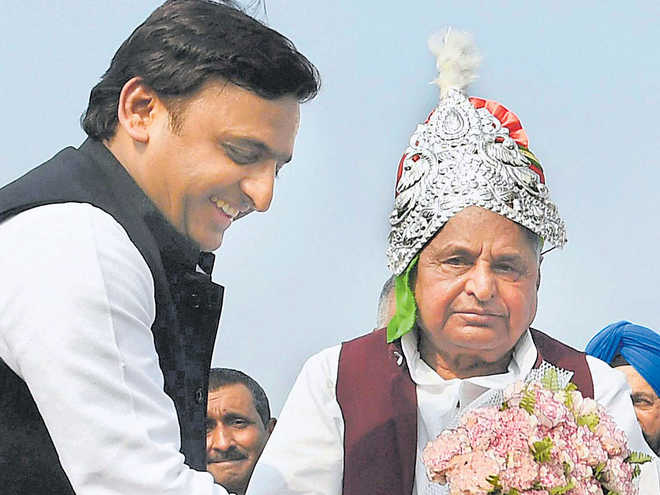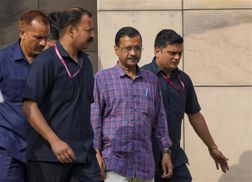
Akhilesh Yadav has managed to wrest control of the party from Mulayam, for now. PTI
K. V. Prasad
Political pundits followed with keen interest the outcome of the protracted ‘dangal’ in Uttar Pradesh, guessing whether the wrestler-turned-leader in Samajwadi Party founder Mulayam Singh Yadav was executing a ‘daav’ or was he really torn between affection for brother Shivpal and love for son Akhilesh Yadav.
In the end, ‘Mulayam Singh’, to use a native wrestling term, was made to bite the dust by the Election Commission of India (ECI).
Now it is a no-brainer that the Mulayam called Netaji — who rose to the zenith of leadership in the intensely caste-ridden politics of Uttar Pradesh — preferred to throw his weight behind Shivpal Yadav while allowing Akhilesh to garner irrefutable legal evidence of the party being solidly behind him.
With the ECI recognising that the faction aligned with Chief Minister Akhilesh Yadav is the Samajwadi Party and the rightful owner of the election symbol of bicycle, the ball in now firmly in the court of the young claimant from the Yadav clan.
By all accounts it was a deftly executed political manoeuvre in which the ECI verdict allowed the winners to claim justice and the losers an honourable exit in what was essentially a family struggle.
The refrain that just as in other professions it is natural for children of political leaders to follow in the footsteps of their parents may be arguable. Yet, the truth is that being a child of an influential leader makes it easy for them to enter the arena without going through the rites of blooding.
Having para-dropped into the elite power club, these children realise it is may be easy to get an entry but the ultimate task of transfer of power is an uphill climb.
Ironically, leaders and political opponents who mocked at the Congress party for promoting dynasty can be faulted for following the same path themselves.
Barring the Left and the Bahujan Samaj Party, today there is hardly any distinguishing feature in political parties of different hues.
All parties of any significance — regional or national — have tilted towards children of powerful leaders when asked to exercise the option of picking a successor, rather than choosing an accomplished ‘karyakarta’.
Over the decades, Indian electorate seemed to have accepted that children of powerful political leaders have an entitlement, first in securing a coveted nomination for an Assembly or parliamentary election, and then entering the chambers after winning the popular vote. Assuming leadership of the party and/or government is the last step towards completing the transition.
While the patriarch or matriarch of a political party may be eager to hand over power, both in the party and the government, Indian political history is replete with instances when such ambitions of a leader to establish a successor from within the family were either halted or stalled, or at best remained a work-in-progress.
Even in the contemporary scenario, many struggles are on, with leaders choosing different models in executing transfer of power.
We have a model in Punjab where Shiromani Akali Dal leader Parkash Singh Badal handed over the reins of the party to son Sukhbir Singh Badal.
The octogenarian Badal, who strides the Indian political scene like a colossus, brought about a shift in power in a gradual manner, where he remained at the helm in the government but allowed the younger Badal to take charge of the party.
While the unprecedented 2012 electoral victory in Punjab underscored the final stamp of authority of the junior Badal over the party, the senior Badal could not ease him into the chief-ministerial saddle despite having him as his deputy.
In neighbouring Haryana, there has been another model. When ‘Tau’ Devi Lal was called for national duty on two occasions, he straightaway had his son Om Prakash Chautala sworn in as chief minister. The first instance was in 1979 and the second a decade later.
These two stints added to just over a year for Chautala as Chief Minister, and it took him and the Indian National Lok Dal another decade to get a full term, that too in coalition with the Bharatiya Janata Party. Chautala’s sons and grandson Dushyant have yet to establish themselves as leaders in their own right.
Of the other two Lals, Bhajan Lal’s best efforts to establish his son Kuldeep Bishnoi as a non-Jat leader did not have the confidence of the voters, while the Bansi Lal clan’s leadership aspiration was derailed after the untimely death of son Surinder.
In Jammu and Kashmir, coached by Mufti Mohammed Sayeed as his heir, People’s Democratic Party leader Mehbooba’s eventual accession came about in different and difficult circumstances.
Her predecessor and National Conference leader Omar Abdullah needed a stint in the opposition before getting the chief-ministerial ‘gaddi’.
Leaders in the South, be it the nonagenarian DMK chief M. Karunanidhi, TDP chief Nara Chandrababu Naidu or TRS supremo K. Chandhrasekhar Rao, are still preparing to have their sons, Stalin, Nara Lokesh, and K. T. Rama Rao, assume leadership.
Jaganmohan Reddy of the YSR Congress failed to cash in on his immensely popular father and chief minister of undivided Andhra Pradesh Y. S. Rajasekhar Reddy following the latter’s tragic death.
Juxtapose these instances with the situation of the late 1960s, when after the departure of Jawaharlal Nehru, Indira Gandhi was locked in an intense power struggle with the old guard. In the 1980-90s the legacy of two socialist leaders of the Nerhu era, Biju Patnaik and Chaudhary Charan Singh, was appropriated smoothly by their sons, Naveen Patnaik and Ajit Singh.
A new crop of party workers and people is trying these new models, some of which have worked and others not. The larger message is not to take things for granted. Leaders have to be elected, and not selected.
In UP, despite Akhilesh Yadav getting positioned firmly in the saddle, the ultimate control of the reins would depend on victory at the hustings.



























